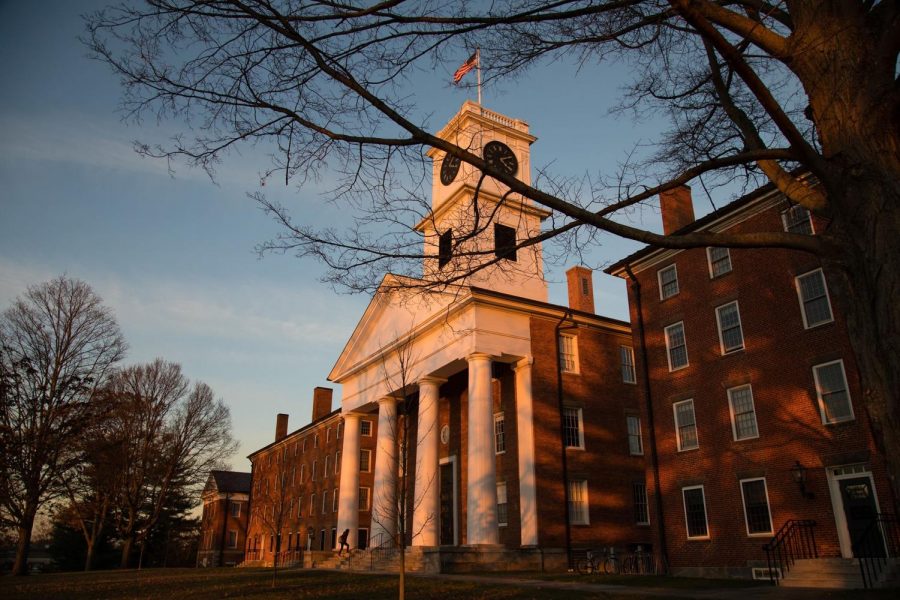A panel of five speakers spoke at Amherst College on March 6 in the Beneski Earth Sciences Building to address several questions on sexual assault and feminism in the wake of the #MeToo movement.
The panel featured Sahar Sadjadi, assistant professor in the Sexuality, Women’s and Gender Studies Department at Amherst College, as well as Masha Gessen, award-winning staff writer for The New Yorker, Loretta J. Ross, national coordinator of Sistersong Women of Color Reproductive Justice Collective, Manuela Picq, visiting professor in SWAGS and Khary Polk, professor in SWAGS specializing in race and gender in the United States military. Amrita Basu, the chair of SWAG department, facilitated the panel.
The event began with an introduction from Basu, stating that the panel would address specific questions in relation to the #MeToo movement. Why did the #MeToo movement take off in 2017? Does the #MeToo movement accurately address sexual misconduct? Should we assume guilty until proven innocent with men accused of sexual assault?
Gessen was the first to speak, addressing the origin of the #MeToo movement as a response to the New York Times’ reporting on the Harvey Weinstein sexual assault allegations, which ultimately forced him to resign from the board of his company, Miramax.
Additionally, Gessen also said that the movement was in response to President Donald Trump – who Gessen called, “a confirmed sexual assaulter being in the White House” – being the leader of this country.
“If that is this country, then many of us would want to live in a different one,” Gessen said.
In regard to whether men accused of sexual assault should assume guilt until proven innocent, Gessen stated that she believes we should only assume this if we agree with the nature of the innocence.
Shifting the conversation to Ross, she spoke on timing of the #MeToo movement, stating that it was a perfect “sweet spot” in the moment of the #BlackLivesMatter movement.
“Since America was too slow to recognize the first threat, it created a space for a sweet spot,” Ross said.
She also highlighted the importance of recognizing the historical progress black women made during the anti-rape movement. According to Ross, white-Hollywood women were given a platform to talk about sexual assault, due to the work that African-American women put in during the first anti-rape movement.
However, in terms of assumptions of innocence toward men alleged of sexual assault, Ross has no second-guesses.
To Ross, sexual boundaries are something that men above the age of 10 should be able to grasp the concept of. To her, the question of sexual assault should regard why powerful men feel like they can do such heinous crimes.
Ross also spoke on her work with the first ever Rape Crisis Center in America, which was pivotal in changing the conversation on sexual assault.
Picq, who gave a more international perspective, saw the #MeToo movement’s effects in both France and Argentina.
According to Picq, in France the #MeToo movement translated to #BalanceTonPorc or ‘Out your Pig,’ where women through Twitter would largely expose the sexual crimes of their perpetrator out to the public.
She then spoke on how women in Argentina were fighting against femicide, the act of killing women. According to Picq, a woman every 33 hours is killed in Argentina.
To Picq, we must address the fear of sexual culture and increase awareness in order to tackle these issues.
Lastly, for a brief moment, Polk spoke on the sexual assault cases found in the U.S. military. Polk first referenced the 2012 film “Invisible War,” which featured accounts of several sexual assault survivors in the military.
The film launched the #NotInvisible movement on Twitter, where women in the military spoke on their sexual assault.
To Polk, the main take away of the #MeToo movement was to wonder if this could be applied to the U.S. military, as Polk asked the audience this simple, rhetorical question.
“Can institutions be trusts to police themselves?” Polk asked. “And in terms of the U.S. military I think the simple answer is, no.”
At the end of the event audience members were given the chance to ask questions.
“How can we move forward from the #MeToo movement in a different legislative world?” asked Amherst College senior environmental science major Ana Ascencio.
In response to the question, Gessen said that she does not believe that living within a “world within a world,” such as academic spaces, is the appropriate way in which the movement should move forward.
Additionally, Polk responded by asking students to “imagine the repercussions you would like to see happen if you were a victim of sexual assault.”
Alvin Buyinza can be reaches at [email protected] and on Twitter @abuyinza_news.




















